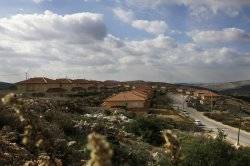Israel approves three West Bank settlements
25/04/2012| IslamWeb
Israel has approved three settlement outposts in the occupied West Bank, the office of Prime Minister Binyamin Netanyahu has said in a statement.
The UN and the US criticized the move, with US State Department Spokeswoman Victoria Nuland calling it unhelpful to making peace with Palestinians.
At a meeting late on Monday, an Israeli ministerial committee "decided to formalize the status of three communities which were established in the 1990s following the decisions of past governments," a statement said on Tuesday.
The three outposts over which the decision was made are Bruchin, Rechalim and Sansana.
Bruchin has nearly 400 residents and is located in the northern West Bank, along with Rechalim, which is home to about 200 people. Sansana, home to around 250 people, is in the southern West Bank, near Hebron.
Condemning the decision, Nabil Abu Rdainah, a spokesman for Mahmoud Abbas, the Palestinian president, said "Netanyahu has pushed things to a dead end yet again".
Palestinians are awaiting a formal response from Netanyahu to a letter they sent last week in which Abbas repeated his call for an end to all settlement activity.
'Hiding the true policy'
The Israeli government had committed to the Supreme Court that it would regulate the status of the outposts, and Netanyahu on Sunday formed a new four-man ministerial committee to seek legal solutions to the contested projects.
Nuland reiterated Washington's opposition to settlement activity and said the US asked Israel, through its embassy in Tel Aviv, for "clarification".
"We are obviously concerned," she told reporters. "We don't think this is helpful to the process, and we don't accept the legitimacy of continued settlement activity."
Meanwhile, the UN chief said he was "deeply troubled" by Israel's decision.
"The Secretary-General reiterates that all settlement activity is illegal under international law. It runs contrary to Israel's obligations under the Road Map and repeated Quartet calls for the parties to refrain from provocations," the office of Ban Ki-moon said in a statement.
Hagit Ofran of Peace Now, an Israeli settlement watchdog, slammed the government for establishing new settlements in what he said was a deceitful way.
"The Israeli government is proving its true policy, that instead of going to peace it is building new settlements," she told the AFP news agency.
"This is the first time since 1990 that the government of Israel decides on establishing new settlements, and the government's manoeuvre, of establishing a committee to establish the settlements, is a trick aimed at hiding the true policy from the public.
"All the years these outposts weren't legal, the state said they aren't for real, and now they suddenly are."
The Netanyahu government has also been trying to prevent the demolition of another illegal settlement, Ulpana, after a court found it was built on private Palestinian land.
The Israeli prime minister has informed the cabinet that he has asked Yehuda Weinstein, the attorney general, to find a solution that would legalize the outpost and prevent its demolition.
Israel considers settler outposts built without government approval to be illegal, but the international community views all settlements as illegal, whether approved by the government or not.
PHOTO CAPTION
Jan. 7, 2008 file photo, a general view of the unauthorized West Bank outpost of Bruchin.
Aljazeera

